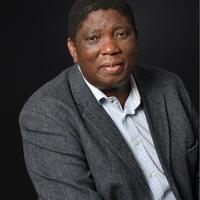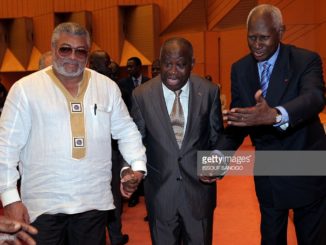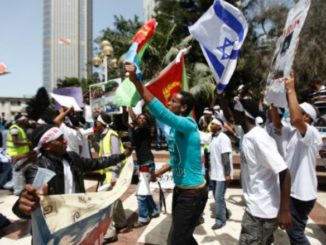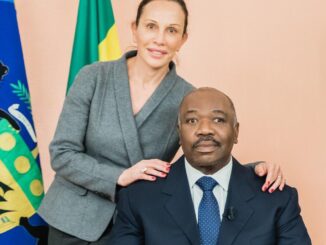
Military coup drums continue to beat on the African continent in 2019. At 4.30am on January 7, Lieutenant Kelly Odong Obiang, leader of the Patriotic Youth Movement of the Gabonese Defence and Security Forces, and a handful of soldiers stormed the TV and radio station in Libreville, Gabon, to announce the seizure of power “for the restoration of democracy”.
The event has similarities to the February 18 coup in 1967 against then-president Léon M’Ba, also perceived to be pro-French by the rebelling soldiers at the time.
Obiang’s address cited “the national shame of the illegitimate government” while also disparaging the ailing President Ali Bongo’s New Year’s address, delivered from his convalescence residence in Rabat, Morocco, and called on the people to rise up.
Obiang’s understanding as to who is behind the crisis in Gabon is instructive when he asserted that: “Once again, one time too many, the wielders of power deceptively continue to instrumentalise the person of Ali Bongo Ondimba, a patient devoid of many of his physical and mental faculties.”
In the last disputed election in 2016, the frustrated opposition leader — former African Union commissioner and Bongo’s brother-in-law, Jean Ping — called for the security forces “to defect and join the people” against “an unrepresentative family dynastic regime”.
Jean Ping observed in a speech after Ali Bongo collapsed in October last year that Gabon has “been on autopilot” during Bongo’s convalescence.
Perhaps Obiang and his comrades in arms were listening. Fast forward to the post-October crisis: on December 23 last year, 44 opposition political parties called for an interim government for two years, during which time the country’s Constitution and institutions are reformed to overcome the regressive Bongo dynastic legacy.
On learning of the recent coup d’état, AU commissioner Moussa Faki Mahamat and France issued statements, unreservedly condemning the unconstitutional removal of government in the Republic of Gabon.
France, the former colonial power, maintains a special partnership with Gabon, the contradictory characteristics of which have intensified in the postcolonial era.
About three hours later, reports indicated that four of the five soldiers who accompanied Obiang in his coup attempt lay dead. One was being pursued by the elite, rapid-reaction Presidential Guard force, which is equipped with modern weaponry, tanks and helicopters.
But what explains this valiant attempt by the young soldiers that was so quickly expunged by the resident French and Moroccan expeditionary force of nearly 900, including ethnic Beteke troops, carefully selected from the Bongo clan in the Haut-Ogooué area of Gabon?
Before delving into the reasons that partially explain the failure of the coup, we need to reflect briefly on the context and historical parallels to the coup attempt.
At the time, government officials in Libreville refused to invoke the constitutional provisions of articles 13 and 16 that would have allowed the speaker of the National Assembly to become the interim leader, with a limited mandate to call elections within 45 days. The officials remained silent on Bongo’s health condition and, at the behest of Prime Minister Emmanuel Issoze-Ngondet, in a submission to the Bongos’ mother-in-law and president of the Constitutional Court, Marie-Madeleine Mborantsuo, the officials introduced a new amendment to the Constitution, providing for the open-ended “temporary unavailability” of the head of state. This allowed Vice-President Pierre-Claver Maganga Moussavou to assume limited control of the public sector and of service delivery.
The fear to go down the constitutional and electoral route was informed by an August 2016 dispute, which Bongo only survived by producing a wafer-thin victory in his home province of Haut-Ogooué where, ostensibly, 99.9% of voters turned up for the poll, 95.9% of whom voted in his favour.
The second historical parallel is the 1964 coup against M’Ba by soldiers who supported Jean-Hilaire Aubame. They seized power by opposing M’Ba’s perceived “serving as a conduit to French interests in Gabon” and were intent on adopting a single party-state system.
During the bloodless coup, soldiers accosted and incarcerated M’ba and his aides, including Cabinet secretary Albert Bongo, before coercing the president to announce on public radio that he had handed over power to the provisional government headed by Aubame.
Significantly, “without invitation” the Élysée Palace, the official residence of the president of France, instructed General Louis Kergaravat and General René Cogny, leading 600 troops drawn from Dakar, Senegal and Congo-Brazzaville, to fly into Libreville to support the 500 resident French marine and Moroccan soldiers and reverse the coup. Barely three days after the coup attempt, M’ba’s administration was restored to power.
M’ba then appointed Albert Bongo to work directly with the French expeditionary contingent, which also protected the 20 00 French nationals working for uranium mining, timber, iron and oil companies.
M’ba was in ill health, so in February 1967, the Gabonese Constitution was amended so that the vice-president would automatically assume the presidency. M’ba died on November 27 in a French hospital and the next day Omar Bongo became president. When Omar died on June 8 2009 he was succeeded by his son, Alain Bernard Bongo.
Successive coup attempts have failed because Gabon has remained a quasi-state with little or no domestic control. Gabon is important to France because it has a pliant political elite, whose primary role is to facilitate the exploitation of natural and mineral resources. Because of this, the country allowed Paris’s strategic objective to develop an independent nuclear capacity, relying on the local uranium, iron and manganese and other lucrative deposits.
Since the 1970s, Gabon has become the fourth-largest African oil producer, and it has vast timber reserves, sourced from the world’s “second Amazon” forest. Michael Reed and Tony Charter state in their 1987 article, Gabon: A Neo-colonial Enclave of Enduring French Interests, that the country has remained a pseudo state “representing an extreme case, verging on caricature of a neo-colonial entity”.
The mandate of the resident military expeditionary force is to enforce the political control of the state and the protection of the 8 900 French nationals who have registered with the embassy and who work in Gabon.
The Presidential Guard falls under the head of intelligence in the ministry of defence, headed up by Bongo’s brother Frederico, and is led by his cousin, Grégoire Kouna. Caught napping by the January 7 capture of the TV and radio station, its swift response soon swatted off the minor challenge.
When Omar Bongo died in 2009, he left behind him 53 “officially recognised” children, according to the African Intelligence Special Report of January 16 2015. This comprador class continues to run the state while feeding off it, state-owned companies and associated commercial entities.
Obiang and the rest of the 44 opposition political parties have reason to believe that “the whole system has to be reformed” to restore democracy in Gabon. If the substantive issues of the failed January 7 coup are not addressed, more brave attempts to change the ailing system will doubtless be made.
–
 Martin Revayi Rupiya is the executive director of the African Public Policy and Research Institute. This is an edited extract from a chapter in his forthcoming book: African Presidents: Sons of Thy Fathers — L’Enfant Terrible & My Brother’s Keeper (Cambridge Scholars Publishing)
Martin Revayi Rupiya is the executive director of the African Public Policy and Research Institute. This is an edited extract from a chapter in his forthcoming book: African Presidents: Sons of Thy Fathers — L’Enfant Terrible & My Brother’s Keeper (Cambridge Scholars Publishing)
This article first appeared on mg.co.za



